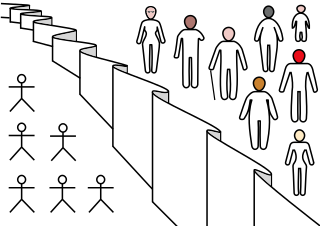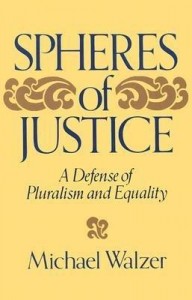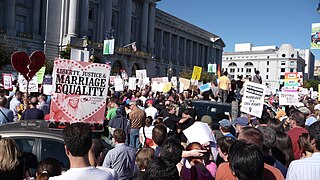Related Research Articles

Jurisprudence is the philosophy and theory of law. It is concerned primarily with what the law is and what it ought to be. That includes questions of how persons and social relations are understood in legal terms, and of the values in and of law. Work that is counted as jurisprudence is mostly philosophical, but it includes work that also belongs to other disciplines, such as sociology, history, politics and economics.

Political philosophy or political theory is the philosophical study of government, addressing questions about the nature, scope, and legitimacy of public agents and institutions and the relationships between them. Its topics include politics, liberty, justice, property, rights, law, and the enforcement of laws by authority: what they are, if they are needed, what makes a government legitimate, what rights and freedoms it should protect, what form it should take, what the law is, and what duties citizens owe to a legitimate government, if any, and when it may be legitimately overthrown, if ever.

In moral and political philosophy, the social contract is an idea, theory or model that usually, although not always, concerns the legitimacy of the authority of the state over the individual. Conceptualized in the Age of Enlightenment, it is a core concept of constitutionalism, while not necessarily convened and written down in a constituent assembly and constitution.
Social justice is justice in relation to a fair balance in the distribution of wealth, opportunities, and privileges within a society where individuals' rights are recognized and protected. In Western and Asian cultures, the concept of social justice has often referred to the process of ensuring that individuals fulfill their societal roles and receive their due from society. In the current movements for social justice, the emphasis has been on the breaking of barriers for social mobility, the creation of safety nets, and economic justice. Social justice assigns rights and duties in the institutions of society, which enables people to receive the basic benefits and burdens of cooperation. The relevant institutions often include taxation, social insurance, public health, public school, public services, labor law and regulation of markets, to ensure distribution of wealth, and equal opportunity.

John Bordley Rawls was an American moral, legal and political philosopher in the liberal tradition. Rawls has been described as one of the most influential political philosophers of the 20th century.
Distributive justice concerns the socially just allocation of resources, goods, opportunity in a society. It is concerned with how to allocate resources fairly among members of a society, taking into account factors such as wealth, income, and social status. Often contrasted with just process, which is concerned with the administration of law, distributive justice concentrates on outcomes. This subject has been given considerable attention in philosophy and the social sciences. Theorists have developed widely different conceptions of distributive justice. These have contributed to debates around the arrangement of social, political and economic institutions to promote the just distribution of benefits and burdens within a society. Most contemporary theories of distributive justice rest on the precondition of material scarcity. From that precondition arises the need for principles to resolve competing interest and claims concerning a just or at least morally preferable distribution of scarce resources.

The original position (OP), often referred to as the veil of ignorance, is a thought experiment used for reasoning about the principles that should structure a society based on mutual dependence. The phrases original position and veil of ignorance were coined by the American philosopher John Rawls, but the thought experiment itself was developed by William Vickrey and John Harsanyi in earlier writings.

A Theory of Justice is a 1971 work of political philosophy and ethics by the philosopher John Rawls (1921–2002) in which the author attempts to provide a moral theory alternative to utilitarianism and that addresses the problem of distributive justice . The theory uses an updated form of Kantian philosophy and a variant form of conventional social contract theory. Rawls's theory of justice is fully a political theory of justice as opposed to other forms of justice discussed in other disciplines and contexts.
"Justice as Fairness: Political not Metaphysical" is an essay by John Rawls, published in 1985. In it he describes his conception of justice. It comprises two main principles of liberty and equality; the second is subdivided into fair equality of opportunity and the difference principle.
In philosophy, economics, and political science, the common good is either what is shared and beneficial for all or most members of a given community, or alternatively, what is achieved by citizenship, collective action, and active participation in the realm of politics and public service. The concept of the common good differs significantly among philosophical doctrines. Early conceptions of the common good were set out by Ancient Greek philosophers, including Aristotle and Plato. One understanding of the common good rooted in Aristotle's philosophy remains in common usage today, referring to what one contemporary scholar calls the "good proper to, and attainable only by, the community, yet individually shared by its members."
Broadly speaking, to be good, is the condition of one having desirable traits, having benefit to someone or something, or is of excellence. Good is generally considered to be the opposite of evil (bad), and is a product of ethics, morality, philosophy, and religion. The specific meaning and etymology of the term and its associated translations among ancient and contemporary languages show substantial variation in its inflection and meaning, depending on circumstances of place and history, or of philosophical or religious context.

Global justice is an issue in political philosophy arising from the concern about unfairness. It is sometimes understood as a form of internationalism.

Spheres of Justice: A Defense of Pluralism and Equality is a 1983 book by the philosopher Michael Walzer.
Luck egalitarianism is a view about distributive justice espoused by a variety of egalitarian and other political philosophers. According to this view, justice demands that variations in how well-off people are should be wholly determined by the responsible choices people make and not by differences in their unchosen circumstances. This expresses the intuition that it is a bad thing for some people to be worse off than others through no fault of their own.
The social norm of reciprocity is the expectation that people will respond to each other in similar ways—responding to gifts and kindnesses from others with similar benevolence of their own, and responding to harmful, hurtful acts from others with either indifference or some form of retaliation. Such norms can be crude and mechanical, such as a literal reading of the eye-for-an-eye rule lex talionis, or they can be complex and sophisticated, such as a subtle understanding of how anonymous donations to an international organization can be a form of reciprocity for the receipt of very personal benefits, such as the love of a parent.
Spatial justice links social justice to space, most notably in the works of geographers David Harvey and Edward W. Soja. The field analyzes the impact of regional planning and urban planning decisions. It is promoted by the scholarly tradition of critical geography, which arose in the 1970s.

Natural Law and Natural Rights is a book by John Finnis first published by Oxford University Press, as part of the Clarendon Law Series. Finnis develops a philosophy of Law in the tradition of Aristotle and Thomas Aquinas – Natural Law. His presentation and defence of Natural Law can be explored from three perspectives. First, polemical, by contradistinction with other philosophies of Law. Second, through its particular methodology, based on practical reasoning. Third, through its substantive content in the form of basic human goods. This article offers a brief overview of each of these perspectives. In addition, his 2011 edition included an extensive Postcript, which is briefly discussed in the 4th Section. A brief appraisal of the book is included in the final section.
Justice and the market is an ethical perspective based upon the allocation of scarce resources within a society. The allocation of resources depends upon governmental policies and the societal attitudes of the individuals who exist within the society. Personal perspectives are based upon ones circle of moral concern or those who the individual deems worthy of moral consideration.
Gerald Allan Cohen, was a Canadian political philosopher who held the positions of Quain Professor of Jurisprudence, University College London and Chichele Professor of Social and Political Theory, All Souls College, Oxford. He was known for his work on Marxism, and later, egalitarianism and distributive justice in normative political philosophy.

Social equality is a state of affairs in which all individuals within a specific society have equal rights, liberties, and status, possibly including civil rights, freedom of expression, autonomy, and equal access to certain public goods and social services.
References
- ↑ Dee, E.T.C. (December 2014). "The Ebb and Flow of Resistance: Analysis of the Squatters' Movement and Squatted Social Centres in Brighton". Sociological Research Online. 19 (4): 96–112. doi:10.5153/sro.3502. S2CID 147386741.
- ↑ "About Justice?". Archived from the original on 13 March 2005. Retrieved 22 November 2019.
- ↑ McKay, George (17 June 1996). Senseless acts of beauty : culture of resistance since the sixties. Verso. p. 175. ISBN 1859840280.
- ↑ Serpis, Almudena (6 January 2012). "Europe's empty houses drive new wave of squatting activism". The Ecologist. Archived from the original on 22 November 2019. Retrieved 22 November 2019.
- ↑ "Justice? Two Years". SCHNEWS. Archived from the original on 8 February 2004. Retrieved 22 November 2019.
- ↑ Goodey, Jan; Purssell, Richard (29 July 2011). "SchNEWS: how road protesters, ravers and GM activists fought back with direct action tabloid". The Ecologist. Archived from the original on 22 November 2019. Retrieved 22 November 2019.
